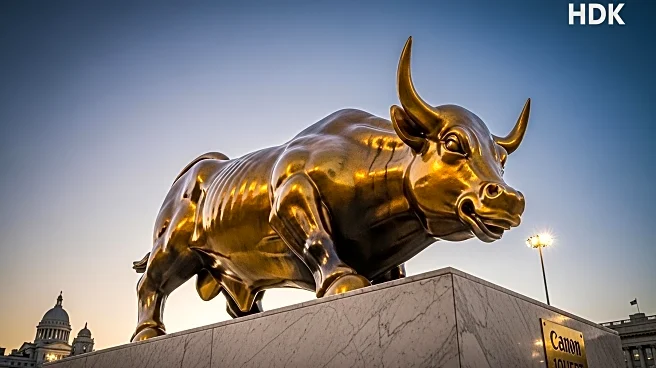What is the story about?
What's Happening?
U.S. stock indexes have reached record highs despite the ongoing government shutdown and concerns over the job market. The Senate did not convene due to Yom Kippur, prolonging the shutdown. Treasury Secretary Scott Bessent warned that economic growth might be impacted, but investors remain optimistic. The job market shows a significant decline in new hirings, down 58% year-to-date compared to last year, marking the lowest level since 2009. However, the jobless rate remains stable at 4.34%, according to data from the Chicago Federal Reserve. Despite these challenges, major companies like Nvidia and Intel have seen substantial gains, contributing to the bullish market sentiment.
Why It's Important?
The record highs in stock indexes indicate strong investor confidence, even amidst political and economic uncertainties. This optimism could bolster the financial markets and encourage further investment, potentially offsetting negative impacts from the government shutdown. Companies like Nvidia and Intel benefiting from this trend may lead to increased innovation and growth in the tech sector. However, the decline in hiring suggests underlying economic vulnerabilities that could affect long-term growth. Stakeholders in the financial and tech industries stand to gain from the current market conditions, while sectors reliant on government stability may face challenges.
What's Next?
If the government shutdown continues, it could lead to more significant economic repercussions, potentially affecting investor sentiment. The Senate's actions in the coming days will be crucial in determining the shutdown's duration and impact. Market analysts, like Tom Lee from Fundstrat, predict further growth in stock indexes, with the S&P 500 potentially reaching 7,000 by year-end. This optimistic outlook hinges on the absence of major disruptions. Investors and policymakers will closely monitor developments to assess the shutdown's impact on economic growth and market stability.
Beyond the Headlines
The current situation highlights the resilience of the U.S. stock market in the face of political instability. It underscores the importance of investor confidence and the role of major corporations in driving market trends. The disparity between stock market performance and job market health raises questions about economic inequality and the sustainability of growth driven by financial markets rather than broad-based economic recovery.














